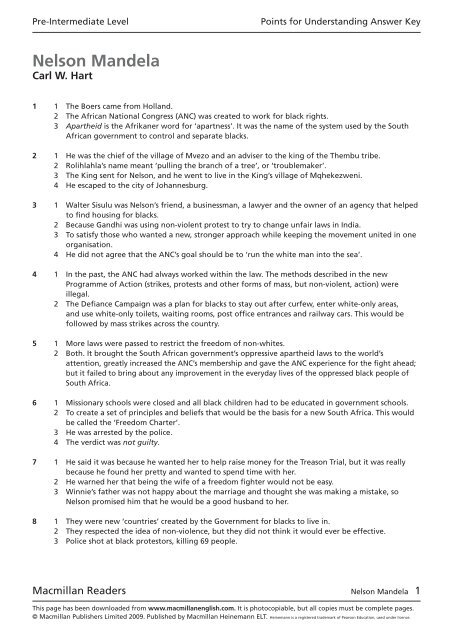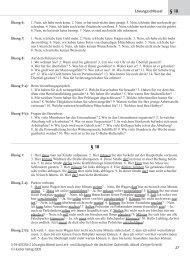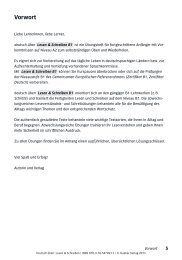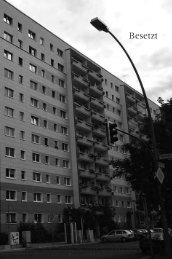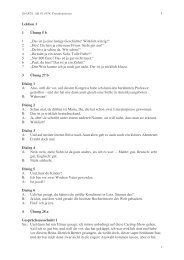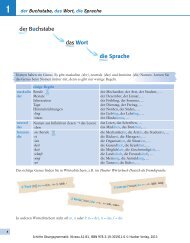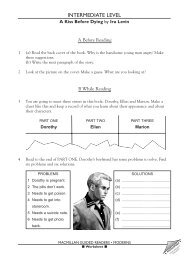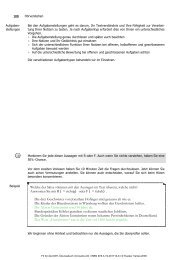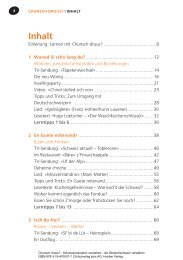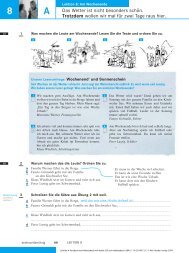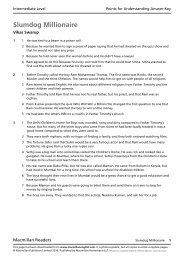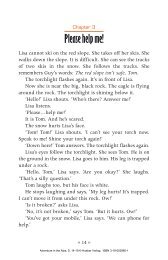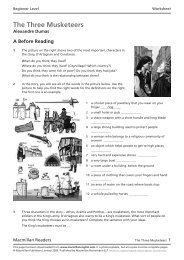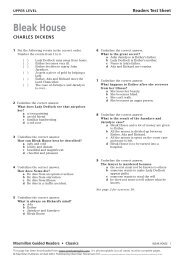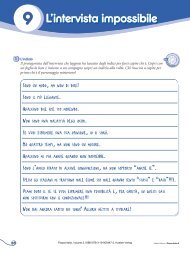Nelson Mandela - Macmillan Readers
Nelson Mandela - Macmillan Readers
Nelson Mandela - Macmillan Readers
You also want an ePaper? Increase the reach of your titles
YUMPU automatically turns print PDFs into web optimized ePapers that Google loves.
Pre-Intermediate Level<br />
Points for Understanding Answer Key<br />
<strong>Nelson</strong> <strong>Mandela</strong><br />
Carl W. Hart<br />
1 1 The Boers came from Holland.<br />
2 The African National Congress (ANC) was created to work for black rights.<br />
3 Apartheid is the Afrikaner word for ‘apartness’. It was the name of the system used by the South<br />
African government to control and separate blacks.<br />
2 1 He was the chief of the village of Mvezo and an adviser to the king of the Thembu tribe.<br />
2 Rolihlahla’s name meant ‘pulling the branch of a tree’, or ‘troublemaker’.<br />
3 The King sent for <strong>Nelson</strong>, and he went to live in the King’s village of Mqhekezweni.<br />
4 He escaped to the city of Johannesburg.<br />
3 1 Walter Sisulu was <strong>Nelson</strong>’s friend, a businessman, a lawyer and the owner of an agency that helped<br />
to find housing for blacks.<br />
2 Because Gandhi was using non-violent protest to try to change unfair laws in India.<br />
3 To satisfy those who wanted a new, stronger approach while keeping the movement united in one<br />
organisation.<br />
4 He did not agree that the ANC’s goal should be to ‘run the white man into the sea’.<br />
4 1 In the past, the ANC had always worked within the law. The methods described in the new<br />
Programme of Action (strikes, protests and other forms of mass, but non-violent, action) were<br />
illegal.<br />
2 The Defiance Campaign was a plan for blacks to stay out after curfew, enter white-only areas,<br />
and use white-only toilets, waiting rooms, post office entrances and railway cars. This would be<br />
followed by mass strikes across the country.<br />
5 1 More laws were passed to restrict the freedom of non-whites.<br />
2 Both. It brought the South African government’s oppressive apartheid laws to the world’s<br />
attention, greatly increased the ANC’s membership and gave the ANC experience for the fight ahead;<br />
but it failed to bring about any improvement in the everyday lives of the oppressed black people of<br />
South Africa.<br />
6 1 Missionary schools were closed and all black children had to be educated in government schools.<br />
2 To create a set of principles and beliefs that would be the basis for a new South Africa. This would<br />
be called the ‘Freedom Charter’.<br />
3 He was arrested by the police.<br />
4 The verdict was not guilty.<br />
7 1 He said it was because he wanted her to help raise money for the Treason Trial, but it was really<br />
because he found her pretty and wanted to spend time with her.<br />
2 He warned her that being the wife of a freedom fighter would not be easy.<br />
3 Winnie’s father was not happy about the marriage and thought she was making a mistake, so<br />
<strong>Nelson</strong> promised him that he would be a good husband to her.<br />
8 1 They were new ‘countries’ created by the Government for blacks to live in.<br />
2 They respected the idea of non-violence, but they did not think it would ever be effective.<br />
3 Police shot at black protestors, killing 69 people.<br />
<strong>Macmillan</strong> <strong>Readers</strong> <strong>Nelson</strong> <strong>Mandela</strong> 1<br />
This page has been downloaded from www.macmillanenglish.com. It is photocopiable, but all copies must be complete pages.<br />
© <strong>Macmillan</strong> Publishers Limited 2009. Published by <strong>Macmillan</strong> Heinemann ELT. Heinemann is a registered trademark of Pearson Education, used under licence.
Pre-Intermediate Level<br />
Points for Understanding Answer Key<br />
9 1 The Spear of the Nation attacked military buildings, railways, phone lines and power stations.<br />
2 <strong>Mandela</strong> was found guilty and sentenced to life in prison.<br />
10 1 An island off the coast of South Africa and the location of South Africa’s maximum security prison.<br />
2 He could not talk to anyone, he lived in a small cell without water or a toilet, and he was allowed<br />
only two letters and two visitors every year.<br />
3 He needed to stay strong because he believed that someday he and his people would be free.<br />
11 1 Steve Biko created and became the first president of the South African Students’ Organisation<br />
(SASO). He was a strong speaker and writer, and created clinics and reading, writing and skills<br />
training programmes in poor black areas. He was arrested and beaten to death by police in 1973.<br />
2 Twenty thousand high school students gathered to protest the new education policy. The police<br />
shot at them, and then a riot started that lasted for several days.<br />
3 ‘Sanctions’ are laws designed to punish a country. The hope of sanctions is that they will hurt the<br />
economy of the country so badly that it will make the changes that are demanded of it.<br />
4 Because they thought he could help end the violence and the economy.<br />
12 1 Because he taught other prisoners about the law and politics and gave them advice that would<br />
help them to become future leaders of South Africa.<br />
2 No. The campaign to free him was growing in strength. Pressure from the outside world continued.<br />
Around the world there were protests. People marched in the streets shouting ‘Free <strong>Mandela</strong>!’ He<br />
was given honours and awards from human rights groups. Streets, schools and parks were given his<br />
name.<br />
3 He offered to release <strong>Mandela</strong> if he would publicly reject the violence, agree to the tribal<br />
homeland policy and agree to live in his tribal homeland, Transkei.<br />
4 <strong>Mandela</strong>’s answer was ‘no’.<br />
5 <strong>Mandela</strong> demanded that all political prisoners had to be freed, that all non-whites should have the<br />
right to vote, and that all bans on political parties had to end.<br />
13 1 No, it didn’t. Although the weeks and months after <strong>Mandela</strong> was freed from prison were a time<br />
of great hope, it was also a time when many South African organisations and people disagreed.<br />
The violence also got worse: between 1990 and 1994, thirteen thousand people died from political<br />
violence.<br />
2 Because they did not want to lose their identity in a non-tribal democratic government.<br />
3 The Nobel Peace Prize.<br />
14 1 It was the first time when all (not just white) South Africans were allowed to vote.<br />
2 Mentally, people thought of white South Africa and black South Africa. Physically, South Africa was<br />
divided into white areas and black areas.<br />
3 <strong>Mandela</strong>’s term in office was a time of great challenges and great progress. Now that apartheid<br />
was ended, economic sanctions were lifted. This brought much needed trade, which helped the<br />
economy. <strong>Mandela</strong> also negotiated peace agreements between Burundi and the Democratic Republic of<br />
Congo, and he signed a new constitution creating a government based on majority rule and protecting<br />
freedom of speech for all. Finally, he got married for the third time, to Graça Machel.<br />
<strong>Macmillan</strong> <strong>Readers</strong> <strong>Nelson</strong> <strong>Mandela</strong> 2<br />
This page has been downloaded from www.macmillanenglish.com. It is photocopiable, but all copies must be complete pages.<br />
© <strong>Macmillan</strong> Publishers Limited 2009. Published by <strong>Macmillan</strong> Heinemann ELT. Heinemann is a registered trademark of Pearson Education, used under licence.


